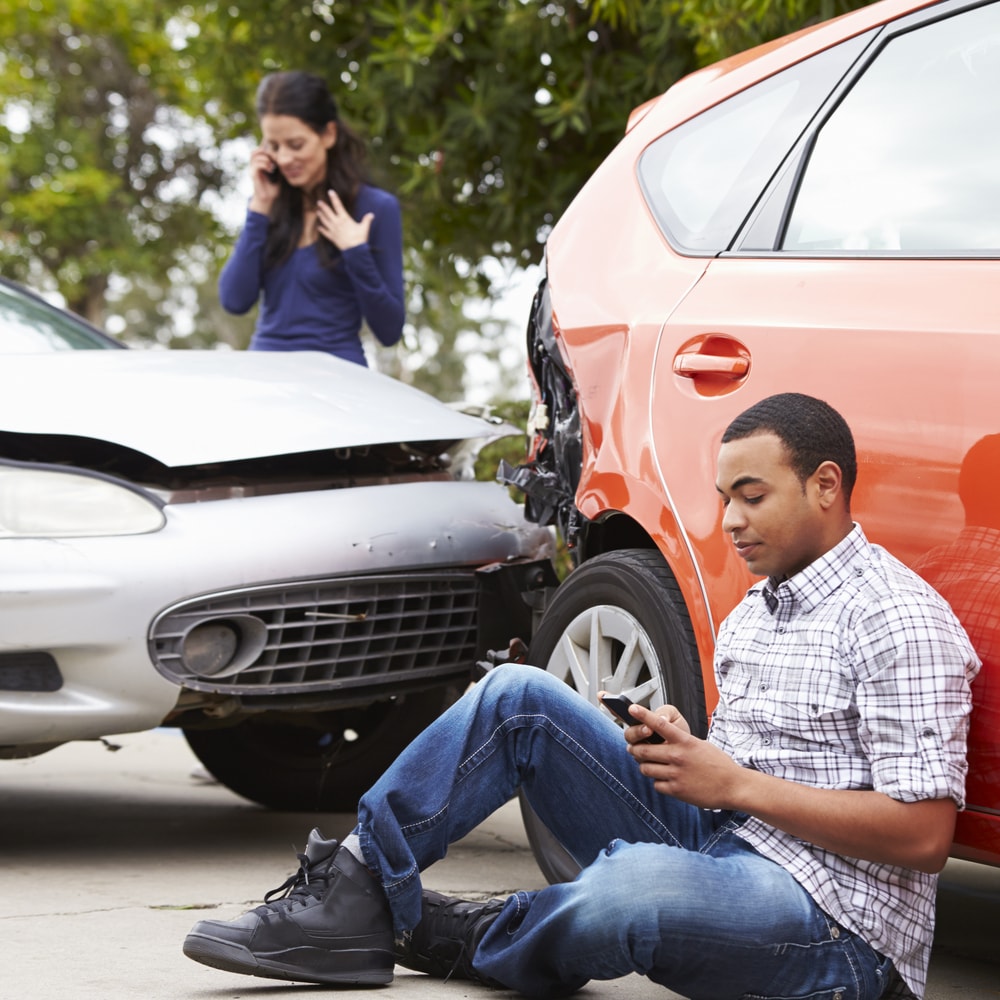
Do you know what to do if you get into a car accident? As drivers, we don’t want to think about the unfortunate event of being in a car accident. But the reality is, there are millions of car crashes in the U.S. each year making it likely that you’ll be involved in an accident at some point in your life. It’s important to be prepared for if and when that day comes. Knowing all the right steps and precautions to take after a car accident can improve your safety and save you from frustration with your insurance company when you have to file the claim.
Throughout the process, you should always try to remain calm. That is often easier said than done because car accidents can be traumatic. It may help to take a minute to relax and calm yourself down if you need to so that you can better focus on what you need to do to document the accident as best as you can.
1. Check for injuries, move to a safe spot and survey the damage
The first thing you want to do after an accident is to check for any injuries suffered by any drivers and passengers involved in the accident and call an ambulance if necessary. If you are injured, keep track of all of your medical expenses that resulted from the accident. If you can, move your vehicle to a safer spot off to the side of the road or in a parking lot. Try to get out of the way so you avoid any additional accidents while you exchange information with the other parties involved. Turn off your car and put your hazard lights on. Check your car for damages and decide if you will need to have your car towed if it isn’t drivable or safe to drive.
One of the common causes of car accidents is severe weather. While some states have a higher rate of fatal winter crashes than others, if you live in a state that experiences snow, make sure you're prepared to handle an emergency in snowy conditions like a car accident.
2. Call the police to get an accident report
It’s important to call the police after an accident to get an accident report. The report can help with your insurance claims process, and it helps establish who is at fault for the accident. Even if it seems clear to you that you weren’t at fault, you could run into difficulties convincing your insurance company that you weren’t at fault and receiving payment from your insurance company if you don’t have an accident report. You should do this even if the accident was minor.
3. Exchange information
The next step is to collect information of everyone involved in the crash and give them your information in exchange. You should ask the driver(s) for their name and contact information along with the vehicle information (make, model and year), driver’s license numbers, license plate numbers and insurance information (company and policy numbers). Make sure to ask passengers and any witnesses who may have stopped for their name and contact information as well. Make note of the accident location and take information from the police officer present regarding his/her name and badge number.
4. Take photos
The best way to document the accident is to take photos, as long as it’s safe. Make sure to take photos of the vehicles involved from all angles and document the scene of where the accident took place.
5. File an insurance claim
If you decide you are going through insurance to fix the damages to your vehicle, the next step is to contact your insurance company as soon as possible to alert them of the accident and file a claim. Some car insurance companies have a claims process that is done online while other companies require you to call them. Make sure to check with your insurance company and know how they handle claims.
What to expect after you file a claim
After you file a claim with your insurance company, you should expect a representative from the company to reach out to you to come and inspect your car. The company will check all of your damages from the accident and the state of your car to determine what it will cost to repair it.
A claims adjuster from your insurance company will review your claim and all of the information provided. You should give them all of the information you collected at the accident scene, including driver and passenger information, photos and the accident report. The claims adjuster will give you a cost estimate. It may feel like you are playing the waiting game during the claims process, but be sure to monitor your claim status, which can often be done online.
Once your claim has been filed and completed, and you have paid your insurance deductible, it’s time to get your car fixed!
Keep in mind your car insurance rates will likely increase at policy renewal time if you were found more than 50 percent at fault for the accident.
Things you should never do after an accident
While there are many things you can do after an accident that can help move the process along more smoothly, there are also certain things that can hurt you in the end. If the accident was your fault, you may be inclined to apologize and assume responsibility for the damages at the scene of the accident. However, you should never admit responsibility to an accident no matter what, especially because you are prohibited from doing so by your insurance company. Your coverage may be affected if you admit fault. Even saying “I’m sorry” to the other driver(s) after an accident can be seen as an admission of fault.
Another thing you should avoid is signing any documents or speaking about the accident before you talk to your own insurance company or your attorney. Don’t tell anyone that the accident was your fault and don’t talk about how it happened to others. A representative from the other insurance company may want to talk to you, but you shouldn’t do that before talking to your attorney or own insurance company. You are not required to talk to the other person’s insurance company at all, but if you do, be very cautious with what you say.
Avoiding accidents
Car accidents are unfortunate, but they can often be avoided. Get into the habit of practicing safe driving with these tips on how you can reduce the likelihood of getting into an accident:
- Be a defensive driver: You should never assume that other drivers are paying attention. Watch out for other people on the road and always be alert so you can react quickly to avoid an accident, even if it’s at the fault of another driver. Additionally, you should avoid aggressive driving and cutting people off.
- Avoid distractions: With the rising popularity of smart phones, drivers are distracted behind the wheel every day and it’s an increasing problem on the roads. To make the roads safer for you and other drivers, avoid anything that takes your attention away from driving.
- Obey traffic laws: The traffic laws are designed to improve safety, so it’s best to obey them. Don’t blow through stop signs and always follow speed limits.
- Check your surroundings: Always be aware of what is around you while driving or when backing up. Be sure to check your blind spots and always know when other cars are around you.
The content on this site is offered only as a public service to the web community and does not constitute solicitation or provision of legal advice. This site should not be used as a substitute for obtaining legal advice from an insurance company or an attorney licensed or authorized to practice in your jurisdiction. You should always consult a suitably qualified attorney regarding any specific legal problem or matter. The comments and opinions expressed on this site are of the individual author and may not reflect the opinions of the insurance company or any individual attorney.







